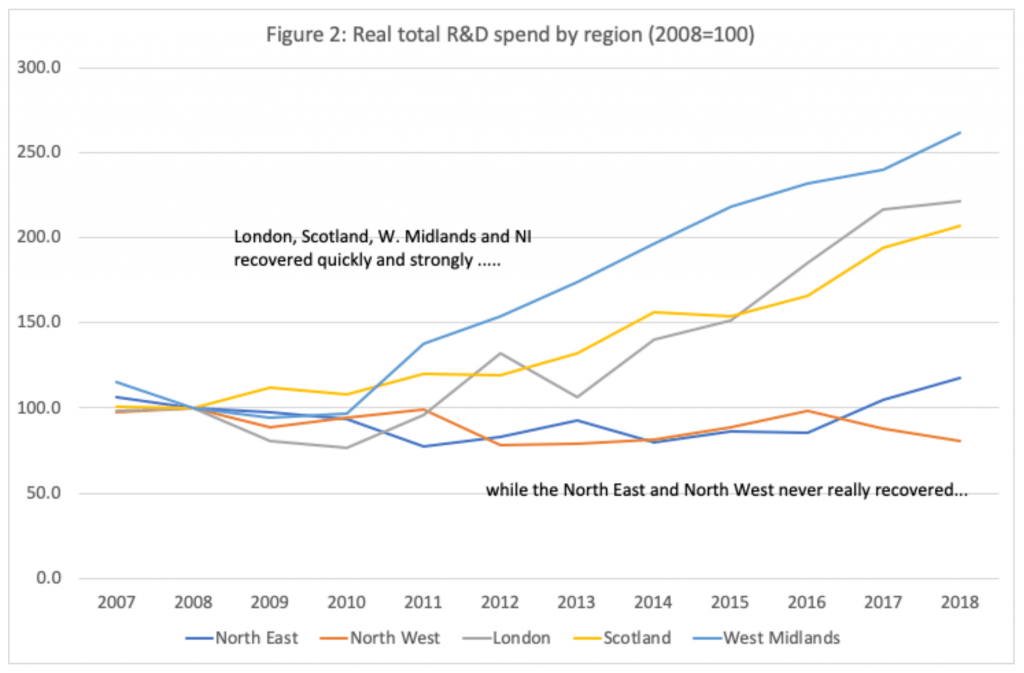
This week:
Innovation: How can we make it better?
Welcome back to Govsight.
This week we’re looking at how innovation spend in both the private and public sectors could be harmed in the impending economic downturn, and why we should be thinking differently about it.
Make sure you follow the conversation on our Twitter and if you’ve been forwarded this email, you can sign up here.
Enjoy,
George Lintott
Editor, Govsight
Public sector R&D investment

What’s happening here?
Cast your mind back to the beginning of March. Concern was dawning about Coronavirus, lockdown was a week or so away and the budget was announced. Forgot about the budget? Easy to do.
Well, today we’re concentrating on the announcement that will double R&D spending over the next 5 years, to reach 2.4% of GDP. It’s a big leap, but will it come to pass in the midst of a recession?
Countries are already feeling the bite, like Australia who could see 7,000 researchers lose their jobs this year. If we look at the last major downturn in 2008 as an indication, the rebound was slow but only really happened in certain regions. The divide still exists with areas in the North never recovering to pre-2008 levels of investment.
Why is this important?
R&D spend is an indication of how much investment both the private and public sectors are spending on innovation. Usually, this takes a hit when budgets are tight.
We’re now in the midst of an economic crash, one that has exposed deep divisions in our society and economy. With innovative solutions required to get us out of this nose-dive, many argue this is the time to innovate and get ahead of your competition. As the then American Express CEO Ken Chenault said in March 2008, “A difficult economic environment argues for the need to innovate more, not to pull back.”
What about private sector investment?
What’s happening here?
In the new budget announcement, half of the 2.4% of GDP spend in R&D must come from the private sector. Again, by looking back to the last downtown in 2008, according to analysis done by Daniele Archibugi et al. the number of EU firms who were not investing or were looking to decrease investment in innovation pre-crisis was around 15%. Post-crisis that percentile grew to 37%.
If we look at more recent past, new global research from an innovation consultancy shows that in March (before heavy lockdown restrictions) the number of firms not looking to invest in innovation this year was 8%. Today? 25%; a whopping 213% increase.
Why is it important?
Innovation spend wasn’t healthy in the private sector pre-crisis to begin with, but research by McKinsey shows that companies who increased investment in innovation, pivoted or pounced on innovative ventures early during the crisis secured an easier time of weathering the storm.
Investment in innovation is widely cited as a key driver for growth and this view is supported by data from the 2008 financial crash, which shows that businesses that invested in innovation during the uncertainty, grew on average 7%, versus those that didn’t, with some suffering revenue losses of up to 15%.
Innovation: how can we make it better?
What’s happening here?
How can we instil confidence in leaders that investment in innovation is important? Well, a co-creation model could provide some confidence. Let’s look at some benefits:
Firstly, businesses might be concerned that (like in the 2008) disrupters may come along and take market share in the midst of the panic. While many startups benefit from their agility and leaner overheads, big corporates tend to have deeper pockets and established distribution channels. Why not partner up and work with SMEs to accelerate their ideas and your own? If you can’t beat them, join ’em right? However, a key part of this is ensuring frameworks are in place to allow for an equal share in input and outcomes so that creativity and innovation aren’t stifled.
Secondly, what this pandemic has shown is that despite being remote from one another, we need to collaborate more than ever. With businesses being hurt across the board, working together and spreading the levels of risk across organisations may increase confidence amongst business leaders to increase time and money spent on innovation.
Thirdly, co-creation and collaboration brings together minds that you may desperately need around you. Feel like your in an echo-chamber? Having collaborators could help you understand the playing field a little better from your home office.
Why is this important?
Shifting the aims of innovation to be easier, more inclusive and more collaborative has been happening for a while. Certainly, work done by Andrea Laplane and Mariana Mazzucato indicates that the nation-state should be more entrepreneurial, to take risks and to invest in co-creation partnerships.
Government and private sector actors need to work together in a more cohesive ecosystem to drive innovation for all, that will drive productivity, that will drive higher wages, that will drive other shiny, nice things for you. So bear it in mind.
Opportunities
- Energy Systems Catapult is searching for help designing and building an Innovator Support Platform for the energy industry. Apply for it here. Closes 12 June.
- Red Kite Community Housing is looking for suppliers to help develop a sustainability strategy for its public housing developments Apply here. Closes 17 June.
- Bournemouth Christchurch and Poole Council are looking to install a dockless bike-sharing concession in Christchurch. Apply for it here. Closes 22 June.
- The United Kingdom Sports Council is looking for a data specialist to assist the Performance Pathway Team which improves systems of performance development Apply here. Closes 26 June.
SME advice
Santander launches X Tomorrow Challenge
Santander has launched a new challenge, looking to fund entrepreneurial projects dealing with the post-Covid-19 fallout. The total pool is EUR1 million, with 20,000 in cash allocated to the winners. the focus of the challenge is in four categories including:
- job creation;
- transforming personal skills;
- reinventing and reopening business and industries;
- and the appearance of new business opportunities.
Deadline is 2 July, apply here.
Tech Together with Tech.London
Tech.London has launched a repository of advice, events, support and other topics for the London tech ecosystem during this pandemic. If you’re looking for support look no further.
Govsight is Nitrous’ fortnightly digest, filled with pocket-size insights into how technology is disrupting cities (CityTech).
At Nitrous, we work with the public sector, corporate actors and tech SMEs to develop co-creation ventures that address city challenges.





